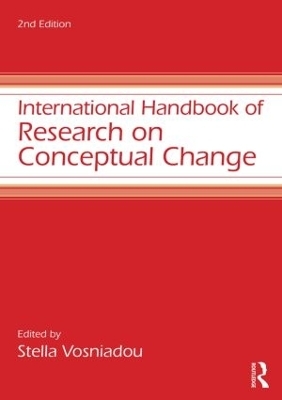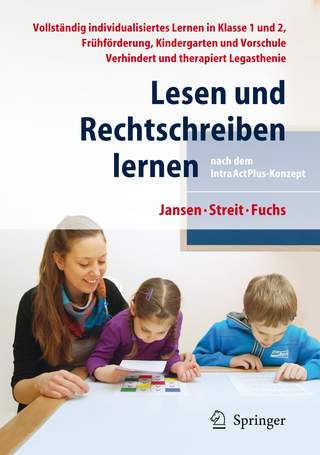
International Handbook of Research on Conceptual Change
Routledge (Verlag)
978-0-415-89883-6 (ISBN)
In thirty-one new and updated chapters, organized thematically and introduced by Stella Vosniadou, this volume brings together detailed discussions of key theoretical and methodological issues, the roots of conceptual change research, and mechanisms of conceptual change and learner characteristics. Combined with chapters that describe conceptual change research in the fields of physics, astronomy, biology, medicine and health, and history, this handbook presents writings on interdisciplinary topics written for researchers and students across fields.
Stella Vosniadou is Professor of Cognitive Psychology in the Department of Philosophy and History of Science at the National and Kapodistrian University of Athens, Greece. She is the current chair of the interdisciplinary graduate program in Cognitive Science between the University of Athens and the Economic University of Athens, and director of the Cognitive Science Laboratory at the University of Athens.
Conceptual Change Research: An Introduction Part I: Theoretical Issues in Conceptual Change Research 1. The Framework Theory Approach to the Problem of Conceptual Change 2. A Bird’s-Eye View of the "Pieces" vs. "Coherence" Controversy (From the "Pieces" Side of the Fence) 3. Two Kinds and Four Sub-Types of Misconceived Knowledge, Ways to Change it, and the Learning Outcomes 4. The Contextuality of Knowledge: An Intentional Approach to Meaning Making and Conceptual Change 5. Relations between Short-term and Long-Term Conceptual Change Part II: Conceptual Change in the Content Areas 6. Conceptual Change in Physics 7. Conceptual Change When Learning Experimental Design 8. Learning and Teaching about Matter in Elementary Grades: What Conceptual Changes Are Needed? 9. Learning and Teaching about Matter in the Middle School Years: How Can the Atomic Molecular Theory be Meaningfully Introduced? 10. Conceptual Change in Naïve Biology 11. Evolutionary Biology and Conceptual Change: A Developmental Perspective 12. Conceptual Understanding in the Domain of Health 13. Changing Historical Conceptions of History 14. Conceptual Change and Historical Narratives about the Nation. A Theoretical and Empirical Approach 15 Conceptual Change in the Social Sciences 16. The Framework Theory Approach Applied to Mathematics Learning 17. The Bundling Hypothesis: How Perception and Culture Give Rise to Abstract Mathematical Concepts in Individuals Part III: Conceptual Change in the Philosophy and History of Science 18. The Problem of Conceptual Change in the Philosophy and History of Science 19. Conceptual Change in the History of Science: Life, Mind, and Disease Part IV: Learner Characteristics and Mechanisms for Conceptual Change 20. Beyond Knowledge: Learner Characteristics Influencing Conceptual Change 21. Mental Modeling in Conceptual Change 22. Roles for Explanatory Models and Analogies in Conceptual Change 23. Conceptual Innovation and Transfer 24. Conceptual Change through Collaboration Part V: Instructional Approaches to Promote Conceptual Change 25. Teaching Science for Conceptual Change – Theory and Practice 26. Self-Organization in Conceptual Growth: Practical Implications 27. The Knowledge Integration Perspective: Connections Across Research and Education 28. Promoting Conceptual Change through Inquiry 29. Representation Construction to Support Conceptual Change 30. Model Building for Conceptual Change Part VI: Reflections 31. Situating Text, Talk, and Transfer in Conceptual Change: Concluding Thoughts
| Reihe/Serie | Educational Psychology Handbook |
|---|---|
| Zusatzinfo | 25 Tables, black and white; 76 Illustrations, black and white |
| Verlagsort | London |
| Sprache | englisch |
| Maße | 174 x 246 mm |
| Gewicht | 1179 g |
| Themenwelt | Geisteswissenschaften ► Psychologie ► Pädagogische Psychologie |
| Sozialwissenschaften ► Pädagogik ► Allgemeines / Lexika | |
| Sozialwissenschaften ► Pädagogik ► Bildungstheorie | |
| Sozialwissenschaften ► Soziologie | |
| ISBN-10 | 0-415-89883-8 / 0415898838 |
| ISBN-13 | 978-0-415-89883-6 / 9780415898836 |
| Zustand | Neuware |
| Informationen gemäß Produktsicherheitsverordnung (GPSR) | |
| Haben Sie eine Frage zum Produkt? |
aus dem Bereich


